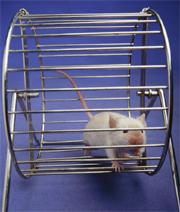 Run for it: can mum's exercise make for a smarter baby?© Alamy
Run for it: can mum's exercise make for a smarter baby?© AlamyPregnant mice who take daily runs boost the production of new brain cells in their babies; but investigators say it is premature to say whether the same could be true in humans.
Researchers already knew that exercise in adult animals can bump up the production of new neurons in a region of the brain called the hippocampus, which is involved in learning and memory. But now it seems that the effect can be passed from mother to offspring.
The team gave one group of pregnant mice a running wheel and kept another group without. Given the chance, the animals ran about two to three kilometres per night, although they cut back as their pregnancy progressed.
To track brain growth, the researchers injected pregnant mice with a dye that marked out newly formed neurons in their infants. They injected other babies with the dye directly, after they were born.
During pregnancy, exercise seemed to dampen the growth of neurons in the developing embryos; babies in the wombs of exercising mothers had roughly 20% fewer neurons three-quarters of the way through pregnancy. But by the time mice were five weeks old, the situation looked quite different. The offspring of exercising mums were forming more neurons, and their hippocampus contained around 40% more of these cells in total.
This was "surprising and amazing", says team leader Gerd Kempermann of the Max Delbruck Center for Molecular Medicine in Berlin, Germany.
By the time mice were seven weeks of age, the rate of neuron production had evened out in the two groups. But the early dip and then boost could potentially have a lasting effect, they say.
The study, published in Proceedings of the National Academy of Sciences1, raises the intriguing idea that pregnant women who regularly work out might also boost the birth of new neurons in their children's brains. The authors point to one study suggesting that the children of exercising mothers scored better on intelligence tests at the age of five.
Run-away theory
But researchers are very cautious about making this leap. "It's an exciting idea, but the data aren't there yet," says Jennifer Bizon, who studies learning and memory at Texas A&M University, College Station.
For one thing, experts don't know whether or not additional neurons in the hippocampus are actually a good thing for the brain, although at least some studies suggest that they are important for learning.
Researchers also have little idea how a mother's exercise could be enhancing the manufacture of new neurons. One idea is that the early drop in neuron production triggered the brain to overcompensate by generating extra cells later on. Another is that running boosts the production of certain growth proteins in the mother that cross the placenta into the offspring.
The opposite effect has been seen from stressing mouse or primate mothers, which seems to dampen production of neurons in the hippocampus of their young. Exercise also boosts stress hormones, so it's unclear why it has such a different effect, says Elizabeth Gould, who examines the production of new neurons at Princeton University, New Jersey.
Loved up
It is possible that the exercise benefits the babies in less direct ways. For example, exercising mothers may simply be healthier themselves and more likely to spend time licking and grooming their pups, and this could stimulate the brains of their offspring. "There's not just one magic bullet," says Gould.
ADVERTISEMENT
The results also raise the question of whether mental stimulation during pregnancy might likewise influence the burgeoning brains of developing children. Adult animals placed in cages with toys are known to produce more neurons than those kept in bland ones. Maybe this effect can also be passed down from a pregnant mother to her child.
"It's a study that just opens up possibilities and questions," says neuroscientist Brian Christie at the University of British Columbia in Vancouver, Canada.
Post a comment to this story by visiting our exerciseboostsbabysbra.html">newsblog.
-
References
- Bick-Sander A., et al. Proc. Natl Acad. Sci. USA, 103 . 3852 - 3857 (2006). http://www.pnas.org/cgi/doi/10.1073/pnas.0502644103
